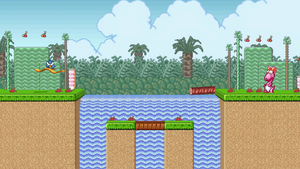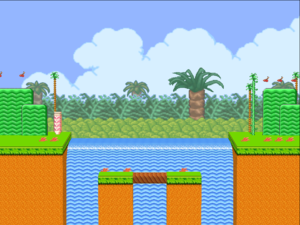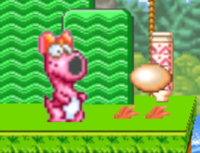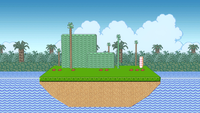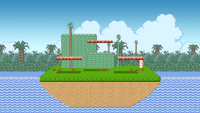Mushroom Kingdom II
| Super Mario Bros. 2 Mushroom Kingdom II | |
|---|---|
Mushroom Kingdom II across the series. | |
| Universe | Mario |
| Appears in | Melee Ultimate |
| Availability | Unlockable (Melee) Starter (Ultimate) |
| Unlock criteria | Obtain the Birdo trophy. |
| Crate type | Normal |
| Maximum players | 4 (Melee) 8 (Ultimate) |
| Article on Super Mario Wiki | Subcon |
- "Subcon" redirects here. For the game that Subcon originally appeared in, see Super Mario Bros. 2.
Mushroom Kingdom II (いにしえの王国II, Ancient Kingdom II) is an unlockable stage in Super Smash Bros. Melee and a starter stage in Super Smash Bros. Ultimate; in Ultimate, its Japanese name has been changed to いにしえの王国 USA (Ancient Kingdom USA), to better reflect the Japanese title of Super Mario Bros. 2, Super Mario USA.
In Melee, Luigi is fought here for his unlocking battle, even if this stage itself is not unlocked yet. However, if the player has not yet obtained the Birdo trophy, they do not unlock the stage. In All-Star mode, this is where the player faces Dr. Mario and any of his teammates.
Stage overview[edit]
The stage has three hard platforms, all of which reach the bottom blast line: two at the sides, and a lower one in the middle (which is actually made up of two pieces of ground connected by a log).
Logs continuously come down from the waterfall in the background, acting as temporary platforms that quickly fall down into the two pits on the sides of the center platform. These logs are completely solid and cannot be passed through so getting caught beneath one once it has entered either pit is a guaranteed KO.
Occasionally, Birdo appears from either side of the screen and shoots eggs, either one or three. These eggs can be attacked, knocking them off, or caught aerially: if thrown at an opponent they deal massive damage and knockback, up to 28%. After being caught and thrown the eggs can be broken, and sometimes contain items. Birdo is susceptible to attacks, and if damaged enough she retreats, or can even be knocked off the stage. Sometimes Pidgits will fly erratically over the middle part on a carpet, which can be jumped on.
Oddly, in Melee, Star KO'd characters will fade before turning into a star. Star KOs cannot occur at all in Ultimate, as with most other stages with 2D backdrops.
Ω form and Battlefield form[edit]
In Super Smash Bros. Ultimate, the Ω form and Battlefield form are set in the air in front of a waterfall, and the main platform is based on the grassy soil of the regular form. The main platform also does not extend below the blast line and is resized and reshaped to match Final Destination. Walk-offs are removed and Birdos, Pidgits, and logs do not interfere with the stage. The design of the three soft platforms of the Battlefield form are based on logs of the regular form.
Hazards Off[edit]
With stage hazards off, Birdo and Pidgits do not appear at all.
Origin[edit]
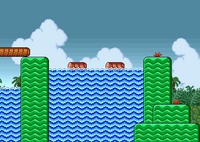
Contrary to this stage's name, it is not based on any location in the Mushroom Kingdom. This stage is based on the overworld sections of World 1 in Super Mario Bros. 2, with its graphical style based on the SNES port of Super Mario Bros. 2 included in Super Mario All-Stars instead of the original NES version.
In Super Mario Bros. 2, Mario, Luigi, Princess Peach, and Toad enter the dream world of Subcon, which was taken over by the game's main villain, Wart. The door they entered through leads to the game's first level, which takes place on a grassy terrain. World 1-1 features waterfalls with logs flowing over, which act as temporary platforms; beanstalks, which functions similarly as ladders; and jars, which functions similarly to the Mario series' Warp Pipes. The players can pluck tufts of grass, which can spawn an item when pulled from the ground, and collect five cherries in each level, which will spawn a Super Star.
Pidgits are small bird enemies that ride on flying magic carpets in Super Mario Bros. 2, first appearing in World 1-2. Pidgits attack by swooping down at the player on their magic carpets. When they are defeated, their carpets can be ridden and controlled by the player, though these vanish after a short while.
Birdos first appear in Super Mario Bros. 2 as the game's recurring mid-bosses, first appearing in World 1-1, but has later appeared as an ally in spin-off Mario titles since. The pink Birdos attack by spitting eggs from their nozzles, which can be picked up and thrown back to defeat them.
This stage features multiple elements from the overworld levels in World 1 in Super Mario Bros. 2, albeit with some visual differences between their appearances in Super Smash Bros. Melee and Ultimate. The 16-bit sprites used in this stage (e.g. the Pidgit's magic carpet, the logs, etc.) in Melee are enhanced to use their original 16-bit sprites from Super Mario All-Stars. The grassy platforms, a single jar, two beanstalks, and five cherries appear as background elements, while the grass appears as a foreground element on the stage, though they cannot be interacted with.
Tournament legality[edit]
For several reasons, this stage is banned in competitive play. The stage is commonly seen as too small to hold a proper competitive battle on, and Birdo's appearances are random and overly disruptive to the matches. The walk-off blast lines can additionally result in quick, easy KOs, and the lack of a proper "central" platform serves as a hindrance, particularly in doubles matches.
Gallery[edit]
Names in other languages[edit]
Trivia[edit]
- When using End of Day on this stage in Ultimate, the camera pans unusually high upward, revealing the edge of the skybox, and making it virtually impossible to jump out of the range of the Red Bulborbs.
- This is one of the five stages in the Super Smash Bros. series to change music when the timer reaches 30 seconds (20 seconds in Melee) and during Sudden Death, the others are Mushroom Kingdom (SSB), Mushroom Kingdom (SSBM), Suzaku Castle (if the music played is any type of one of the sixteen playable characters in Street Fighter II and Super Street Fighter II) and Moray Towers.
- Mushroom Kingdom II is the only one of these stages where the music used for this Easter egg is not set as the default track.
- Mushroom Kingdom II and Mushroom Kingdom are the only two stages in Melee to share an alternate music track: Dr. Mario. They are also the only two stages in Melee to lack a stage prefix.
- When a new file is started in Melee, the player automatically receives one random trophy among those immediately obtainable in the lottery. Since the Birdo trophy is one of them, it is possible for the Mushroom Kingdom II stage to be immediately unlocked upon starting a new file, with the corresponding unlock message being received right when the game starts up.
- The Moon cannot be summoned from an Assist Trophy on this stage. Additionally, Lunala cannot be summoned from a Poké Ball.
- Color TV-Game 15 and Abra can only be summoned on the Battlefield and Omega forms of this stage.
| Stages in Super Smash Bros. Melee | |
|---|---|
| Starter stages | Brinstar · Corneria · Fountain of Dreams · Great Bay · Green Greens · Icicle Mountain · Jungle Japes · Kongo Jungle · Mushroom Kingdom · Mute City · Onett · Pokémon Stadium · Princess Peach's Castle · Rainbow Cruise · Temple · Venom · Yoshi's Island · Yoshi's Story |
| Unlockable stages | Battlefield · Big Blue · Brinstar Depths · Final Destination · Flat Zone · Fourside · Mushroom Kingdom II · Poké Floats |
| Dream Land · Kongo Jungle · Yoshi's Island | |
